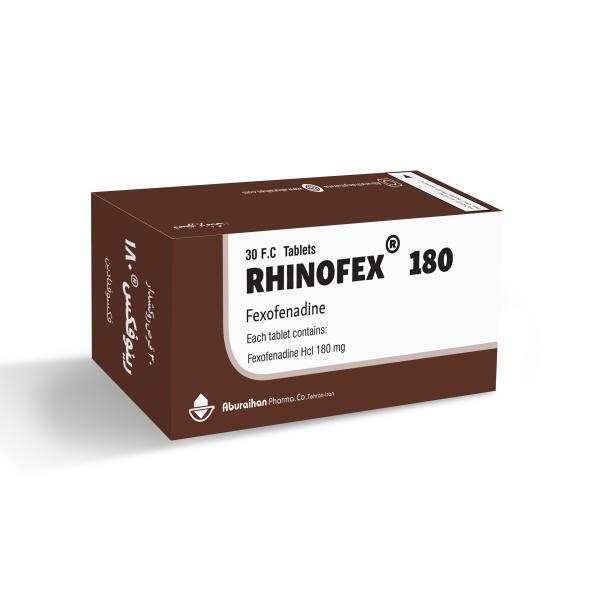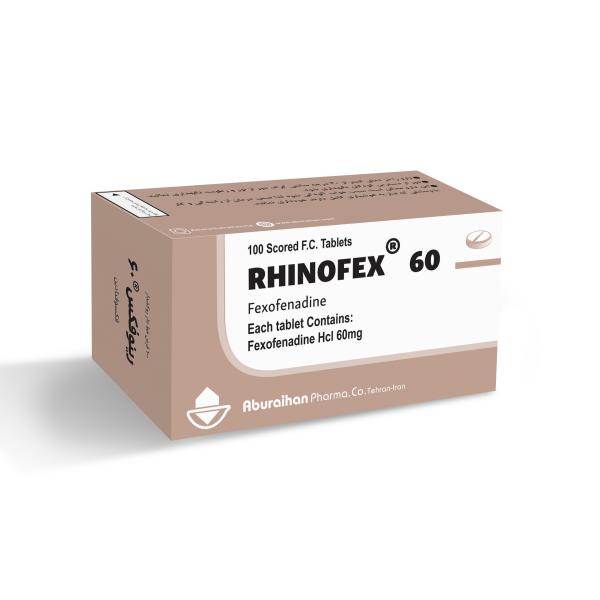Rhinofex ®
fexofenadine
tablet
60 – 120 – 180 mg
Upper respiratory allergies: Temporary relief of runny nose, sneezing, itching of the nose or throat, and/or itchy, watery eyes due to hay fever or other upper respiratory allergies, Urticaria
Mechanism of Action:
Fexofenadine is an active metabolite of terfenadine and like terfenadine it competes with histamine for H1-receptor sites on effector cells in the gastrointestinal tract, blood vessels and respiratory tract; it appears that fexofenadine does not cross the blood-brain barrier to any appreciable degree, resulting in a reduced potential for sedation.
Method of Administration:
Upper respiratory allergies:
Twice-daily formulations: Oral: 60 mg every 12 hours (maximum: 120 mg/day).
Once-daily formulations: Oral: 180 mg once daily (maximum: 180 mg/day).
Urticaria, new onset and chronic spontaneous (off-label use):
New onset: Oral: Initial: 180 mg once daily. If symptom control is inadequate, may immediately increase to 180 mg twice daily.
Chronic spontaneous: Oral: 180 mg once daily (Kaplan 2005). If symptom control is inadequate, add a different second-generation antihistamine; higher doses of fexofenadine have not been shown to be more effective in controlling urticaria symptoms in most patients
Notes
When used for self-medication do not use if you ever had an allergic reaction to fexofenadine or any component of the formulation.
Interactions:
Antacids: May decrease the serum concentration of Fexofenadine. Management: Separate the administration of fexofenadine and aluminum- or magnesium-containing antacids. Risk D: Consider therapy modification.
CloZAPine: Anticholinergic Agents may enhance the constipating effect of CloZAPine. Management: Consider alternatives to this combination whenever possible. If combined, monitor closely for signs and symptoms of gastrointestinal hypomotility and consider prophylactic laxative treatment. Risk D: Consider therapy modification.
Metoclopramide: May enhance the CNS depressant effect of CNS Depressants. Risk C: Monitor therapy
Nitroglycerin: Anticholinergic Agents may decrease the absorption of Nitroglycerin. Specifically, anticholinergic agents may decrease the dissolution of sublingual nitroglycerin tablets, possibly impairing or slowing nitroglycerin absorption. Risk C: Monitor therapy
Pregnancy and Lactation:
Agents other than fexofenadine are preferred for the treatment of allergic conditions, such as rhinitis, pruritus, and urticaria, in pregnant women.
Information specific to fexofenadine and breastfeeding has not been located. Drowsiness and irritability have been reported in breastfed infants exposed to antihistamines, use with caution.
Warning and Precaution:
Renal impairment: Use with caution in patients with renal impairment; dosage adjustment may be recommended.
Adverse Reactions:
Central nervous system: Headache (5% to 11%)
Gastrointestinal: Vomiting (children 6 months to 5 years: 4% to 12%)
Storage:
Store below 30ºC and protect from light and moisture.



